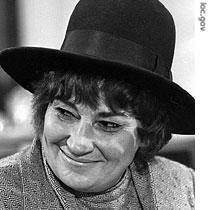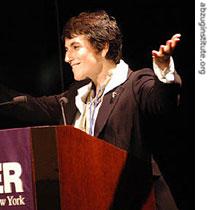VOA慢速英语 2008 0427
搜索关注在线英语听力室公众号:tingroom,领取免费英语资料大礼包。
(单词翻译)
VOICE ONE:I'm Rich Kleinfeldt.
VOICE TWO:
 |
| Bella Abzug |
And I'm Shirley Griffith with the VOA Special English program PEOPLE IN AMERICA. Today, we tell about Bella Abzug. She was a member of the United States Congress in the nineteen seventies. She also was a well-known activist1 for civil rights and women's rights.
(MUSIC)
VOICE ONE:
Bella Abzug was well known for many reasons. She was a lawyer and activist. She represented New York City in Congress. She spoke2 in a loud voice. And she always wore large hats.
Miz Abzug supported women's rights and civil rights. She had strong opinions on many issues. She opposed the American involvement in the war in Vietnam. She made public her opinions on most important issues. In fact, she was called one of the most outspoken3 members of Congress.
Bella Abzug also acted on her beliefs. She wrote legislation to prevent unfair treatment of women. She presented the first bill for equal rights for homosexuals. She often denounced the majority of the members of Congress who were white males. She said they did not know about the lives and problems of most people in America.
VOICE TWO:
Bella Abzug did know about the lives of common Americans. She was born Bella Savitsky in the Bronx area of New York City in nineteen twenty. Her parents had come to the United States from Russia. Her father operated a food store called The Live and Let Live Meat Market. Bella said she knew from the age of eleven that she wanted to be a lawyer. At the age of twelve, she gave her first public speech. It was in an underground train station in New York.
VOICE ONE:
 |
| Liz Abzug, President of the Bella Abzug Leadership Institute, speaks at Hunter College where her mother attended school |
Bella attended Hunter College and Columbia Law School in New York City. She married Martin Abzug in nineteen forty-four. He was a stockbroker4 and writer. He had no interest in politics. But he was his wife's best friend and supporter. They had two daughters.
Bella Abzug became a lawyer in the nineteen forties. She represented labor5 union workers. She also represented people involved in civil rights cases. She often worked for no payment in these cases. In the nineteen fifties, she represented people accused of subversive6 activities by Senator Joseph McCarthy.
VOICE TWO:
Bella Abzug began wearing large hats when she was a young lawyer. There were very few women lawyers in America then. She told this story about why she began wearing hats: "Working women wore hats. It was the only way they would take you seriously. After a while I starting liking7 them. When I got to Congress, they made a big thing of it. They did not want me to wear a hat. So I did."
(MUSIC)
VOICE ONE:
In the nineteen sixties, Bella Abzug became an anti-war activist. She organized a group of anti-war women, called Women Strike for Peace. She opposed American involvement in the war in Vietnam. And she opposed testing of nuclear weapons. She led demonstrations8 in Washington against the war and in support of a ban against nuclear weapons. She became a leader of the movement against President Johnson because of his involvement in the war.
In the early nineteen seventies, Miz Abzug also became a leader of the growing women's rights movement that was spreading across the country. She helped form the National Women's Political Caucus9. In speaking to the group in nineteen seventy-one, she demanded equal rights for women in all areas of American life.
(SOUND)
VOICE TWO:
In nineteen seventy, Bella Abzug was elected to the House of Representatives as a Democrat10 from New York City. She was fifty years old. She was the first Jewish woman elected to Congress. Her campaign statement was: "This woman belongs in the House." She did not mean her house. She meant the House of Representatives. At the time, there were only ten female members in the House of Representatives.
During her first day as a member of Congress, Miz Abzug introduced a resolution calling for an immediate11 withdrawal12 of American troops from Vietnam. The resolution was defeated.
Later in her term, she tried other ways to reach that goal. She forced the administration of President Nixon to surrender documents about the Vietnam War that were known as the Pentagon Papers. She also was the first member of Congress to call for an impeachment13 investigation14 of President Nixon.
VOICE ONE:
Miz Abzug supported many programs to help American families. For example, she wanted national insurance to help pay for health care for all Americans. And, she wanted the government to establish centers to care for young children while their mothers worked.
She wanted these programs paid for with money cut from the budget of the Defense15 Department. She did not succeed in getting this legislation passed in Congress. Yet she kept trying.
VOICE TWO:
Representative Abzug was known for her forceful way of expressing her opinions. Yet House Speaker Thomas "Tip" O'Neill chose her as one of his assistants. She helped write the Freedom of Information and Privacy Acts. These laws restricted the right of
the Federal Bureau of Information to withhold16 information.
Miz Abzug served in the House of Representatives for six years. In nineteen seventy-six, she gave up her seat in the House to campaign for the Democratic nomination17 for senator from the state of New York. She lost the election. She ran unsuccessfully for mayor of New York City. She also lost two more elections that would have returned her to the House of Representatives.
VOICE ONE:
For twenty more years, Bella Abzug continued to work for women's rights. In nineteen seventy-nine, President Carter appointed her the head of a National Advisory18 Committee on Women, a non-paying job. Later, President Carter dismissed her when she criticized his decision to cut money for women's programs. In nineteen ninety, she started the Women's Environmental and Development Organization, which works with international agencies.
Miz Abzug was one of the leaders of an international conference of women. Thousands of women attended that conference in Beijing, China in nineteen ninety-five. They discussed ways for women around the world to gain equal rights.
(MUSIC)
VOICE TWO:
Bella Abzug wrote two books. The first is called “Bella! Ms. Abzug Goes to Washington.” It is about her first year in Congress. Her second book was published in nineteen eighty-four. It is called “Gender Gap: Bella Abzug's Guide to Political Power for American Women.” In her later years, she continued to serve as a delegate to Democratic national conventions. She was leader of the New York City Commission on the Status of Women. And she directed the National Parity19 Campaign to increase the number of women elected to political office.
VOICE ONE:
Miz Abzug once said that equal rights for women was at the top of the list of the many issues she supported. She was one of the first leaders of the feminist20 movement. She defined the word feminist this way: A person who believes that there should be social, economic and political equality for women. She thought that the majority of Americans believed this.
Many women supported Miz Abzug because of her efforts to gain equality for women. She helped make it easier for other women to be elected to public office.
VOICE TWO:
Yet, Bella Abzug had enemies. Many people did not like her. They thought she was too loud, too aggressive, too independent, too liberal. However, most political experts agree that Bella Abzug should be included on any list of the most influential21 women in American politics in the twentieth century.
Bella Abzug died in nineteen ninety-eight following a heart operation. She had been in poor health for several years. She was seventy-seven. Many of her friends in the women's movement continue to miss her spirit, her voice, and her hats.
(MUSIC)
ANNOUNCER:
This program was written by Shelley Gollust. It was produced by Lawan Davis. The announcers were Rich Kleinfeldt and Shirley Griffith. I'm Faith Lapidus. Listen again next week for People in America in VOA Special English.




